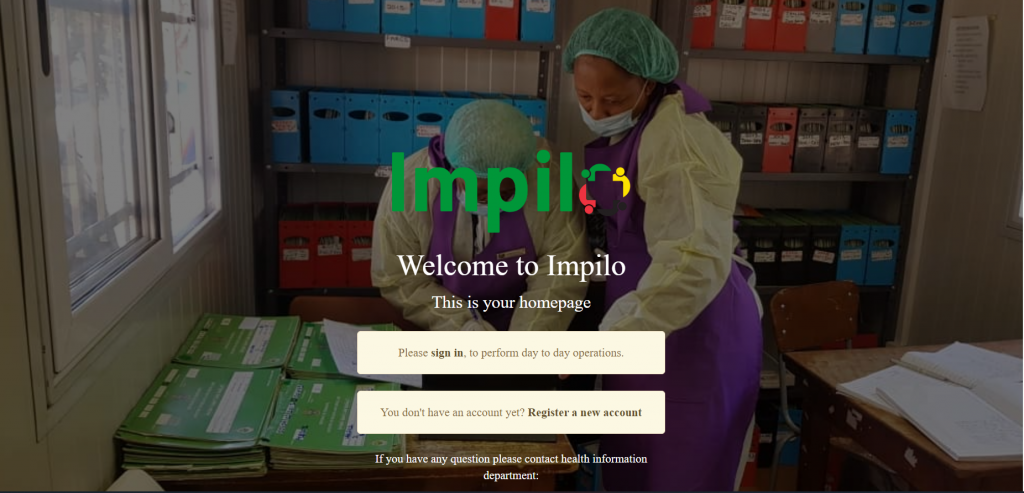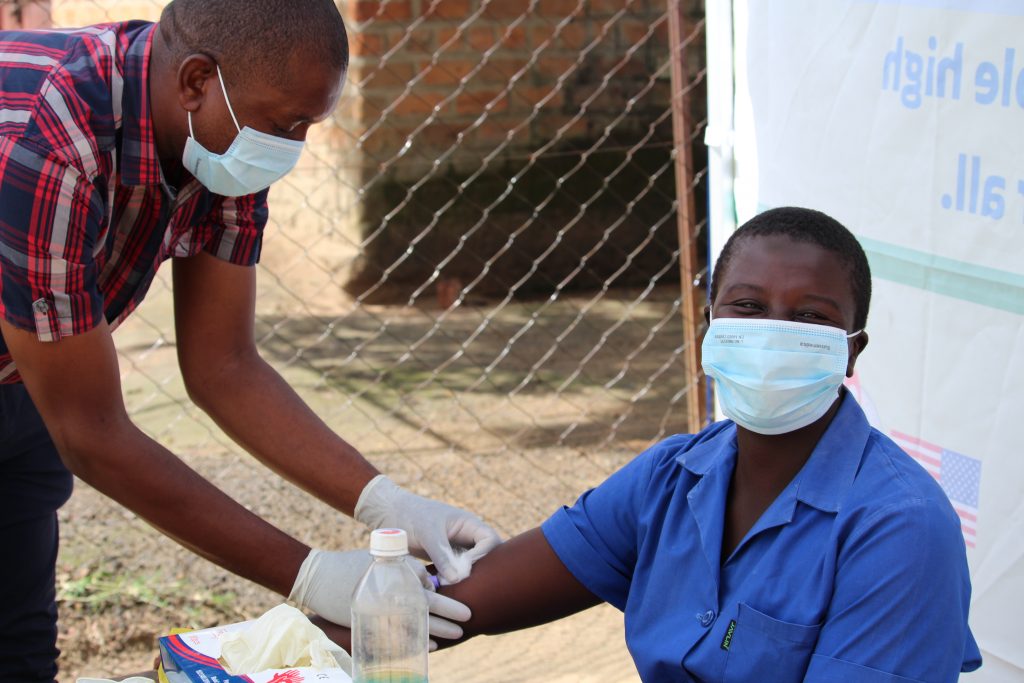It is almost midday in Tshiyakwakhiwe village, Dlamini in Tsholotsho, the scorching sun’s intense rays’ heat glares down my neck and I quickly break out into more than a little sweat. Loud squeaky voices and cows bellow can be heard from a distance approaching the Gombalume safe space. Tall trees give plenty of shade under the blazing sun and we all rush to take shade while a group of young girls approach us and take shade under the trees next to us.
Among the group of Adolescent girls and young women that arrive one girl with a baby on her back stood out as she confidently greets us and introduces herself. Her name is Lucia Ncube and she is 19years from Tshiyakwakhiwe village ward 2 of Tsholotsho district. Her confidence stuns all of us and we wonder how such a young innocent girl has a 4 month old baby,
“I innocently fell in love with my boyfriend and because of young and immature love we quickly started engaging in sexual activities. He assured me that I was not going to get pregnant if we indulge for the first time and he promised he was not going to impregnate me. I naively believed him and I gave in. A month later, a bomb dropped on me, I was pregnant,” narrated a bright-faced Lucia, you would expect her to sadly share her story but that was not the case with her.
Born and bred in Tsholotsho, one of the most conserved communities in Zimbabwe, Lucia had little to no information on her Sexual Reproductive Health Rights and this was a taboo conversation to be discussed in a family setup,
“Growing up, we never discussed issues to do with practicing safe sex , family planning, and sex in general. As a young girl I was discouraged to talk about such issues. I could have practiced safe sex, avoided pregnancy and being a mother at a young age,” she said.
“Use of any family planning methods was unheard of especially for Adolescent Girls and Young Women who would have never had children. Family planning was attached to myths of possible lifetime infertility yet every woman`s dream is to breastfeed at some point in their life,” shared Lucia.
In January 2022, Lucia enrolled in the Zimbabwe Partnership to Accelerate AIDS Control (ZimPAAC), supported DREAMS program that is being implemented in the Matabeleland North province of Zimbabwe in Lupane, Tsholotsho, Bubi and Nkayi districts.
“The DREAMS program has changed my life for the better. It has opened my eyes. If I had had the information I have now earlier my life would have been different. However there is no need to cry over spilled milk, I have decided to make my life better for me and my son,” said Lucia
“ Now I know how to protect myself while practicing safe sex, I know how to avoid unwanted pregnancies, I have access to family planning methods, HIV self-testing and the use of Pre- Exposure Prophylaxis. Through the Health4Life sessions I have learnt that I have rights to protect myself and my body, I have learnt about financial literacy and how important it is for me to save and start my own business. This is something I had never thought of but now I need to build a bright future for my son.”
“We were trained on ISALS and we have started a group with my friends and we intended to assist each other start a business and build a better future for us,” She said.
Lucia is one of the 27 000 AGYW mentored through the DREAMS program to date to enhance knowledge, strengthen social protection of AGYW, and build social assets. The DREAMS program seeks to reduce new HIV infections among the most vulnerable adolescent girls and young women by 40% in the highest HIV burden districts in Zimbabwe. DREAMS implementing partners (Bantwana and Pangaea Zimbabwe AIDS Trust) under the ZImPAAC consortium prioritize AGYW’s health, wellbeing, and HIV epidemic control through the provision of evidence-based curricular and need-based secondary services.
Zimbabwe Technical Assistance, Training and Education Center (Zim-TTECH) is the recipient of a new five-year PEPFAR award- Strengthening Epidemiology and Strategic Information grant through the Center for Disease Control (CDC). The award officially begins on 30th September 2022
The award will be implemented through the “Impilo” Electronic Health Record (EHR)/CBS program. The program aims to build the Ministry of Health and Child Care’s (MOHCC) capacity at the national, provincial, and district levels to collect key strategic information (SI) required to measure progress towards achieving epidemic control and generate a strong evidence base for informed program decision-making in Zimbabwe.
Zim-TTECH envisions universal access to safe, client-centered, and high-quality healthcare for all people while working to improve the health and well-being for all through the provision of technical assistance and direct service to the health sector, as well as strengthening healthcare worker skills to support the sustainability of health systems.


It was on the 5th of September 2017, in the evening, when Lucienne (41years) decided to administer an HIV self-test in the comfort of her home together with her husband. Like all the other days, after hectic farm work, Lucienne was tired and wanted to rest but after visiting her best friend who is the Village health worker who gave her an HIV self-test kit, she wanted to do the test that night and get it over and done with.
“I remember the day and time vividly, the 5th of September 2017, around 8 pm in the evening. 20 minutes later the results came in, and we were all HIV positive. We could not believe it at first. How can a self-test kit show that we were both positive? It could not be,” she said.
After a week of deep thinking and chatting to a close friend who advised her to visit the nearest clinic, Lucienne decided to do another test at the local Nyameni clinic in Marondera,
“My husband tagged along, though he was skeptical about it, we were both scared, but we had to be certain and sure of our HIV status. The results came and we were all HIV positive. That is when reality sunk in. We were so angry with each other at that moment,” she said.
“We were quickly initiated on ART. Back home, our Village Health worker who is also a friend stood with us and assisted us with all the information we needed, we forgave each other and started to live positively,” said ever-smiling Lucienne.
Lucienne and her husband are well known at Sambok farm as they live an open life, they do not hide that they are living with HIV and take their medication openly.
“I am not ashamed of my status, my children know our status, and taking our medication is a family business, my children remind us every day of the need to take our medication religiously,”
“Being HIV Positive is not the end of the world. One can live a healthy and normal life if they adhere to taking their medication as prescribed,” she said.
Zim-TTECH, under the Zimbabwe Partnership, to Accelerate AIDS control consortium, strives to reach hard-to-reach communities through Community outreach approaches where clinical services are provided to the community. Services such as Viral Load sample collection, HIV testing, Cervical cancer screening, ART Refill, Condom Distribution, and PrEP initiation and uptake are provided during the outreach.
Lucienne gets her Viral load sample collected, ART Refill, and Cervical cancer screening services all at once.
In collaboration with the Ministry of Health and Child Care, ZimPAAC works in 395 facilities in 20 districts deploying more than 800 skilled health care workers to meet the UNAIDS “95-95-95” targets towards HIV epidemic control:
- Ensuring 95% of all persons living with HIV know their status by providing integrated testing
- Ensuring 95% of individuals diagnosed with HIV are initiated on antiretroviral therapy (ART) and retained in care
- Ensuring 95% of people on treatment are virally suppressed
Zim-TTECH activities encompass:
- Building the capacity, skills and knowledge of health care workers through training and site-level mentoring at health facilities to strengthen health service by improving patient linkages between HIV testing, initiation on treatment, and retention in care rates.
- Working with health facilities to improve the availability and quality of HIV prevention, treatment, care and support services through site support and quality improvement projects.
- Supporting public facilities to offer client-centered services to vulnerable and most at risk groups, such as key and priority populations.
- Increasing uptake of pre-exposure prophylaxis services through training, technical assistance and direct client support.
- Conducting index testing through community linkages activities that help clients, and their sexual partners and biological children, access HIV testing.
- Providing community outreach to identify persons needing HIV services and linking them to HIV testing and treatment services, such as partner testing and tracking of patients lost to follow-up.
- Strengthening PMTCT services in alignment with MoHCC plan to eliminate mother-to-child transmission.
- Strengthening TB/HIV collaborative activities to ensure screening, prevention and follow-up of clients.
- Distributing TB preventive therapy for ART clients.
- Providing differentiated service delivery through multi-month refills, Family and Community ART Refill Groups.
- Increasing access to services for children and adolescents through Africaid’s Community Adolescent Treatment Supporters (CATS)
The ZAZIC consortium implements VMMC as a part of a combination HIV prevention package approved by the MoHCC. The ZAZIC model uses an integrated approach, blending local clinic staff supported by MoHCC with partner staff. ZAZIC works in 38 static facilities in 13 districts and provides services at over 150 outreach sites.
The ZAZIC consortium implements VMMC as a part of a combination HIV prevention package approved by the MoHCC. The ZAZIC model uses an integrated approach, blending local clinic staff supported by MoHCC with partner staff. ZAZIC works in 38 static facilities in 13 districts and provides services at over 150 outreach sites.
The ZAZIC consortium supports:
- Service delivery in 13 districts from consent procedures to circumcision, post-surgical care and linkage to other services
- Training using MoHCC approved curricula, health workers in the supported districts are trained on the surgical technique as well as on demand creation
- Development and implementation of age appropriate demand creation strategies
- Comprehensive monitoring and evaluation including continuous quality improvement and operations research